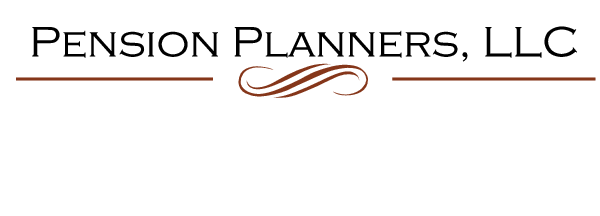Copyright 2012: Pension Planners, LLC. Pension Planners. All rights reserved.
4168 Douglas Blvd., Ste. 300 Granite Bay, CA 95746 916-791-9095
Frequently Asked Questions
1. What is a Qualified Plan?
The technical definition for a qualified plan is one that satisfies the requirements of IRC Section 401(a). A Qualified Retirement Plan is known for the numerous tax advantages the plan allows. Contributions made into the plan are not taxed until you withdraw the money which allows an investor to save more money than in other types of retirement plans. A qualified plan is established by a business and is subject to the provisions of the Employee Retirement Income Security Act (ERISA). Some of the most common types of qualified retirement plans consist of Profit Sharing Plans, 401(k) plans, and Defined Benefit Plans.
2. What does it mean to be vested in my retirement account?
To be vested in a retirement account, simply means you can take the money with you if you leave the company. For example, if you are 75% vested, then you can take 75% of your investment with you when you leave. In a 401(k) plan, you are 100% vested in the money you defer into your retirement plan or individual pension plan.
3. Is my qualified retirement plan protected from creditors?
YES, a qualified retirement plan is protected from creditors under the employee Retirement Income Security Act (ERISA). ERISA requires qualified plans to include provisions that prohibit the assignment of plan assets to a creditor. Qualified plans are also protected from creditors during bankruptcy.
4. If own a business with no employees, can I have a 401(k) plan?
Yes, this type of plan may enable you to maximize contributions because you can make both employee salary reduction contributions (elective deferrals) and employer contributions. To qualify, net compensation for a one-person 401(k) plan is less than $184,000.
5. Can I rollover funds from an existing retirement account into a qualified retirement plan?
Yes, click here to view a Comparison Chart of Allowable Rollover
6. What are the advantages of a Qualified Plan versus an IRA?
There are many advantages of having a Qualified Retirement Plan versus an IRA. Click here to view the Advantages of a Qualified Plan vs. an IRA chart.
7. What types of businesses can set up Qualified Retirement Plans?
Sole Proprietorship, C Corporation, S Corporation, Partnership, Limited Liability Corporation (LLC), Limited Liability Partnership (LLP), and Not For Profit 501 (c)(3).
8. Can I purchase life insurance through a qualified retirement plan?
Yes, this can dramatically cut life insurance costs by allowing premiums to be paid with mostly tax deductible rather than after tax dollars. The Tax Code also allows you to deduct the plan contributions that are used to pay for life insurance premiums.
9. What other investment opportunities are available through a qualified retirement plan?
There are a variety of investment options found in qualified retirement plans that are not available in other retirement plans. The following are investments allowed:
- Tax Lien Certificates
- Apartment Buildings, Co-Ops, and Condominiums
- Commercial Property
- Gold Bullion
- Improved or Unimproved Land (leveraged or un-leveraged)
- Joint Ventures
- Limited Liability Companies (LLCs)
- Single Family and Multi-Unit Homes
- Trust Deeds and Mortgage Notes
- Securities, Certificates of Deposits, Stocks, Bonds, Mutual Funds
- U.S. Treasury Gold and Silver Coins
- Leases
- Like and Unlike Exchanges
- Commodities / Future Accounts
- Contracts of Sale
- Factoring
- Palladium
10. What do I need to establish and implement a Qualified Retirement Plan?
What do I need to establish and implement a Qualified Retirement Plan?
1. Fill out an Information Request Form necessary for Pension Planners, LLC to provide plan information and help you choose the right plan for your business.
2. Pension Planners will prepare plan documents in compliance of IRS regulations.
3. Obtain Federal ID # for trust.
4. Provide employees with the plan specifics.
5. Fund the plan with new contributions or rollovers.Â
6. Plan assets must be invested.
11. What is a self-directed 401(k)?
A self-directed 401(k) is technically no different than any other 401(k) or IRA. It's unique because of the available investment options. Most custodians only allow approved checks, bonds, mutual funds and CDs. A truly self directed IRA/401(k) allows those types of investments PLUS real estate, notes, private placements, tax lien certificates and much more.
12. What are the benefits of a self directed 401(k)?
In addition to the tremendous 401(k) benefits (tax-free profits, tax deductions, asset protection and estate planning), you can invest tax-free in investments that you know and understand, which through the power of compounding interest, can create true wealth for you and your family.
13. Why haven't I heard of a self directed 401(k) before?
While the concept of investing in real estate and other assets in retirement plans has been around for more than 30 years, it hasn't received a great deal of attention. Why? Most custodians that offer 401(k)s (banks and brokerage firms) focus on mutual funds and CDs-because they have vested financial interests in having you select those investments from them.
Because a majority of custodians focus on stocks and CDs, there's a common misperception that these are your only investment options for retirement plans. But this is not the case.
14. Are self directed 401(k)s allowed under IRS rules?
Yes-as long as you follow relevant rules. IRS Publication 560 and 590 clearly state the rules and regulations governing IRAs and qualified retirement plans such as 401(k)'s.
15. Are there special rules for self directed 401(k) investments?
Yes. To ensure compliance, you should be familiar with specific rules for 401(k)s, and , in particular, self-directed 401(k)s.
There are certain types of transactions that you cannot perform through a 401(k). Most importantly, the IRS prohibits self-dealing investments in which you or family members of lineal descent have prior ownership.
16. How can I be sure that my investment is allowable in an QRP?
IRS Publication 590 states what investments are prohibited in IRSs; these investments include artwork, stamps, rugs, antiques and gems.
All other investments, including stocks, bonds, mutual funds, real estate, promissory notes, foreclosures, and tax liens are acceptable as long as IRS rules governing retirement plans are followed.
17. My CPA/attorney/financial advisor hasn't heard of a self directed 401k? What Should I Do?
It's not uncommon for trusted advisors to never have heard of self directed IRAs or QRPs, given the relatively unknown nature of these accounts. At Pension Planners, LLC we have worked with many professional advisors across the country to educate them regarding QRPs and self directed QRP rules so they can best customize advice to meet your personal needs.
18. Are there special rules for self directed QRP investments?
Yes. To ensure compliance, you should be familiar with specific rules for QRPs and in particular, self directed QRPs, there are certain types of transactions that you cannot perform through a QRP. Most importantly, the IRS prohibits self-dealing investments in which you or family members of lineal descent have prior ownership.
19. Are my self directed QRP investment guaranteed?
No investment (aside for FDIC-insured deposits) is guaranteed. However, most successful investors feel that the risk of investing in assets they know and understand is much less than the risk associated with making only conventional QRP investments.
20. Are self directed QRP's for everyone?
Self directed QRPs are not for everyone. They are for those who want to create wealth by using their knowledge of investing in assets other than stocks, bonds and CDs.
21. Why Should I Open a 401(k)?
The 401(k) is attractive to employers and employees because of the high contribution limits and large tax deductions available. Plus, you have the ability to truly self direct investments in traditional and non-traditional assets. Two components comprise the maximum 401(k) plan contribution:
1) An employee salary-deferral contribution In 2018, the employee con contribute up to $18,500 annually through salary deferral, although this may not exceed 100% of the employees pay.
An employee salary-deferral contribution In 2018, the employee con contribute up to $18,500 annually through salary deferral, although this may not exceed 100% of the employees pay.
2) An employer profit-sharing contribution The annual limit for this is 25% of the employees pay.
An employer profit-sharing contribution The annual limit for this is 25% of the employees pay.
The total annual contribution limit from both sources is $55,000 in 2018. However, individuals age 50 and over may contribute a catch up contribution of $6,000 in 2018 allowing a total contribution limit of $61,000.
22. Who is Eligible?
The main requirement for a 401(k) is earned income as an employee. Employees can contribute funds on a post-tax elective deferral basis or as pre-tax deferrals under their traditional 401(k) plans.
Pension Planners, LLC
2250 Douglas Blvd. Suite 160
Roseville, CA 95561
Phone: 866-485-7929
4381 W. Flamingo Rd #38307
Las Vegas, NV 89103









